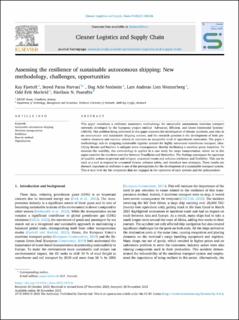| dc.contributor.author | Fjørtoft, Kay Endre | |
| dc.contributor.author | Parvasi, Seyed Parsa | |
| dc.contributor.author | Nesheim, Dag Atle | |
| dc.contributor.author | Wennersberg, Lars Andreas Lien | |
| dc.contributor.author | Mørkrid, Odd Erik | |
| dc.contributor.author | Psaraftis, Harilaos | |
| dc.date.accessioned | 2024-01-12T12:14:33Z | |
| dc.date.available | 2024-01-12T12:14:33Z | |
| dc.date.created | 2023-12-15T14:18:21Z | |
| dc.date.issued | 2023 | |
| dc.identifier.citation | Cleaner Logistics and Supply Chain (CLSC). 2023, 9, 100126. | en_US |
| dc.identifier.uri | https://hdl.handle.net/11250/3111308 | |
| dc.description.abstract | This paper introduces a resilience assessment methodology for sustainable autonomous maritime transport networks developed by the European project entitled “Advanced, Efficient, and Green Intermodal Systems” (AEGIS). This problem being addressed in this paper concerns the investigation of threats, incidents, and risks in an autonomous- and sustainable shipping context, and the research question is the development of both preventive measures and reactive actions to maintain an acceptable level of operational constraints. The paper’s methodology aids in designing sustainable logistics systems for highly automated waterborne transport, identifying threats and barriers to mitigate event consequences, thereby facilitating a seamless green transition. To examine the usability, this methodology is applied in a case study for cargo transportation, where we in this paper consider the maritime corridor between Trondheim and Rotterdam. The findings encompass the spectrum of possible actions to prevent and mitigate unwanted events and enhance resilience and flexibility. This can be used as a tool to respond to unwanted threats, enhance safety, and introduce new strategies. These results are deemed important as resilience is one of the prerequisites for the development of a sustainable transport system. This is true both for the companies that are engaged in the operation of such systems and for policymakers. | en_US |
| dc.language.iso | eng | en_US |
| dc.publisher | Elsevier | en_US |
| dc.rights | Navngivelse 4.0 Internasjonal | * |
| dc.rights.uri | http://creativecommons.org/licenses/by/4.0/deed.no | * |
| dc.title | Assessing the resilience of sustainable autonomous shipping: New methodology, challenges, opportunities | en_US |
| dc.title.alternative | Assessing the resilience of sustainable autonomous shipping: New methodology, challenges, opportunities | en_US |
| dc.type | Peer reviewed | en_US |
| dc.type | Journal article | en_US |
| dc.description.version | publishedVersion | en_US |
| dc.rights.holder | © 2023 The Author(s). Published by Elsevier. | en_US |
| dc.subject.nsi | Marin teknologi | en_US |
| dc.source.pagenumber | 16 | en_US |
| dc.source.volume | 9 | en_US |
| dc.source.journal | Cleaner Logistics and Supply Chain (CLSC) | en_US |
| dc.identifier.doi | 10.1016/j.clscn.2023.100126 | |
| dc.identifier.cristin | 2214199 | |
| dc.relation.project | Norges forskningsråd: 324726 | en_US |
| dc.relation.project | EC/H2020/859992 | en_US |
| dc.source.articlenumber | 100126 | en_US |
| cristin.ispublished | true | |
| cristin.fulltext | original | |
| cristin.qualitycode | 1 | |

